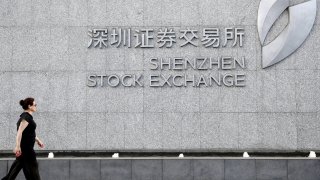
- Shares in Asia-Pacific were largely lower in Monday trade as Chinese stocks led losses regionally.
- China's producer inflation for March was higher than expected. The producer price index surged 8.3% as compared with a year ago, official data showed Monday, above expectations for a 7.9% increase in a Reuters poll.
- Chinese consumer inflation also rose more than expected in March, with the consumer price index climbing 1.5% year-on-year. That was above expectations in a Reuters poll for a 1.2% increase.
SINGAPORE — Chinese stocks led losses in Asia-Pacific markets on Monday as investors reacted to China's inflation data for March and monitored the Covid situation on the mainland.
Mainland as well as Hong Kong stocks have been tumbling all day, but losses deepened by Monday's market close. The CSI 300 index, which tracks the largest mainland-listed stocks, fell 3.09% to 4,100.07. Shanghai composite was down 2.61% to about 3,167.13 while the Shenzhen component tumbled 3.671% to 11,520.21.
Hong Kong's Hang Seng index closed 3.03% lower at 21,208.30. Hong Kong-listed shares of Chinese electric vehicle maker Nio plunged 11.44% after the firm announced a suspension in production due to disruptions at its supply chain partners as a result of the Covid outbreak.
Get Connecticut local news, weather forecasts and entertainment stories to your inbox. Sign up for NBC Connecticut newsletters.
China's producer inflation for March was higher than expected. The producer price index surged 8.3% as compared with a year ago, official data showed Monday, above expectations for a 7.9% increase in a Reuters poll.
Chinese consumer inflation also rose more than expected in March, with the consumer price index climbing 1.5% year-on-year. That was above expectations in a Reuters poll for a 1.2% increase.
"I think the more notable fact is the big gap between CPI and PPI, and that indicates that pricing power amongst most companies in China is weak and they're taking a hit on margins," Ramiz Chelat, portfolio manager at Vontobel Asset Management, told CNBC's "Street Signs Asia" on Monday.
Money Report
The data release comes as mainland China is fighting to control its worst wave of Covid since the beginning of the pandemic in early 2020. Shanghai reported a record high combined number of cases for Sunday, 914 with symptoms and 25,173 without.
"Given the infectiousness of omicron, we could see more localized lockdowns being a recurring theme," Chelat said. "We think you need to be very selective in China, look for companies that can deliver in a growth-challenged environment."
Elsewhere, the Nikkei 225 in Japan slipped 0.61% on the day to 26,821.52 while the Topix index shed 0.38% to 1,889.64. South Korea's Kospi dipped 0.27% to close at 2,693.10.
Australia's S&P/ASX 200 bucked the overall trend regionally as it climbed 0.1%, finishing its trading day at 7,485.20.
Over in Southeast Asia, shares of tech firm GoTo soared around 13% from their issue price as they made their debut in Indonesia. The broader Jakarta Composite, on the other hand, shed earlier gains as it declined 0.1% to 7,203.79.
MSCI's broadest index of Asia-Pacific shares outside Japan slipped 1.55%.
Oil falls close to 2%
Oil prices were lower in the afternoon of Asia trading hours, with international benchmark Brent crude futures down 1.78% to $100.95 per barrel. U.S. crude futures shed 1.92% to $96.37 per barrel.
The U.S. dollar index, which tracks the greenback against a basket of its peers, was at 99.739 after recently crossing the 100 level.
The Japanese yen traded at 125.22 per dollar, still weaker as compared to levels below 123.2 seen against the greenback last week. The Australian dollar was at $0.7433 following last week's drop from above $0.763.






